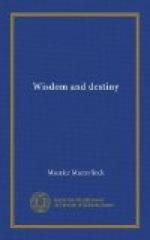51. I do not pretend that destiny is just, that it rewards the good and punishes the wicked. What soul that were sure of reward could ever claim to be good? But we are less just than destiny even, when it is destiny that we judge. Our eyes see only the sage’s misfortune, for misfortune is known to us all; but we see not his happiness, for to understand the happiness of the wise and the just whose destinies we endeavour to gauge, we must needs be possessed of wisdom and justice that shall be fully equal to theirs. When a man of inferior soul endeavours to estimate a great sage’s happiness, this happiness flows through his fingers like water; yet is it heavy as gold, and as brilliant as gold, in the hand of a brother sage. For to each is the happiness given that he can best understand. The sage’s misfortune may often resemble the one that befalls other men; but his happiness has nothing in common with that which he who is not wise terms happiness. In happiness there are far more regions unknown than there are in misfortune. The voice of misfortune is ever the same; happiness becomes the more silent as it penetrates deeper.
When we put our misfortunes into one scale of the balance, each of us lays, in the other, all that he deems to be happiness. The savage flings feathers, and powder, and alcohol into the scale; civilised men some gold, a few days of delirium; but the sage will deposit therein countless things our eyes cannot see—all his soul, it may be, and even the misfortune that he will have purified.
52. There is nothing in all the world more just than happiness, nothing that will more faithfully adopt the form of our soul, or so carefully fill the space that our wisdom clings open. Yet is it most silent of all that there is in the world. The Angel of Sorrow can speak every language—there is not a word but she knows; but the lips of the Angel of Happiness are sealed, save when she tells of the savage’s joys. It is hundreds of centuries past that misfortune was cradled, but happiness seems even now to have scarcely emerged from its infancy. There are some men have learned to be happy; why are there none whose great gladness has urged them to lift up their voice in the name of the silent Archangel who has flooded their soul with light? Are we not almost teaching happiness if we do only speak of it; invoking it, if we let no day pass without pronouncing its name? And is it not the first duty of those who are happy to tell of their gladness to others? All men can learn to be happy; and the teaching of




